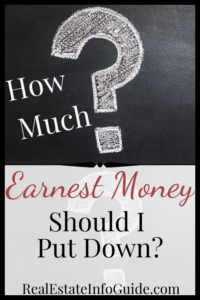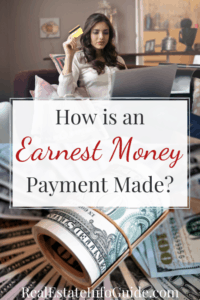One of the elements of the home buying process that often confuses both first time and experienced buyers alike is earnest money. Entirely different and separate from your deposit, in a hot housing market where the seller has multiple offers to choose from, earnest money can be the factor that decides between a successful offer to buy and one that fails.
So, if it’s not a deposit, and yet you still have to pay it at the start of the home buying process, what is the purpose of earnest money?
The purpose of earnest money is to show the seller that you are serious about buying their home. If you decide not to buy the home, for a reason that is not covered by a contingency in the purchase agreement, the seller keeps the earnest money as compensation.
However, if the sale goes through as expected, the earnest money goes towards your payment for the home. In essence, it is like paying a percentage of your deposit upfront to show you are genuine in your desire to buy the home.
 What Exactly Is The Purpose Of Earnest Money?
What Exactly Is The Purpose Of Earnest Money?
When a home seller accepts a buyer’s offer, they are, in some respects, taking a leap of faith. The seller has to believe that the buyer is sincere in their wish to buy the home because, once the offer to purchase is accepted, the property is taken off of the market. At this stage, the seller agrees not to show the property to any other prospective buyers and not to accept any other offers.
Now the current homeowner is in the position where, if the buyer were to suddenly turn around in a months time, and say “I’ve changed my mind, I don’t want to buy the house after all” the seller has lost:
- A month where they could have been marketing their abode to other prospective buyers.
- The home viewings that may have taken place during that time.
- Any potential buyers that may have made an offer on the home, but have since found another property to buy.
In addition to these potential loses, the purchase of the seller’s new home may be put in jeopardy if they have to start again with the sale of their current home.
To prevent buyers from making random offers that they then withdraw without good reason, a standard property purchase requires the payment of earnest money. This is a “good faith” payment that says to the seller:
“I am genuinely serious about buying your property. In fact, I am so serious that I am willing to put this money on the line. If I back out of the deal, for a reason not covered by a contingency, you can keep the earnest money. As compensation for your time and any losses.”
Exceptions To The “Off The Market” Situation
Occasionally, in an exceptionally tight housing market, a seller may negotiate an offer that includes a clause allowing the seller to continue showing the home to other prospective buyers until a particular stage in the buying process. This is, however, relatively unusual and does not impact the purpose of earnest money.
What Happens To The Earnest Money If The Sale Falls Through?
Let’s Assume the offer to purchase includes all of the standard contingencies to protect the buyer and the seller. If this is the case and the purchase does not go ahead as planned, what happens to the earnest money depends on the reasons the sale fell through.
- If there was something wrong with the property. If the home inspection finds an issue that affects the value of the home, and the buyer and seller cannot come to an agreement over how to deal with this, the buyer can withdraw, and their earnest money is returned to them.
- If there is an issue with the appraisal. If the appraisal is lower than the offered purchase price, and the buyer and seller cannot or do not wish to renegotiate the price, the earnest deposit is returned to the buyer.
- If the buyer’s financing falls through. Again, if the financing falls through and the sale cannot be satisfactorily renegotiated, the buyer has the earnest money returned to them.
- If deadlines are passed. If the closing date is approaching and the sale is delayed or if the closing date passes and the sale has not been completed, the buyer and seller may renegotiate a new closing date. However, neither party is obliged to do so. What happens to the earnest money is then dependant on the reason for the delay.
- If the buyer withdraws from the sale, “just because.” Should a situation arise where the buyer changes their mind about the property for a reason not covered by a contingency, for example, they see another home they like better and want to buy that instead, the seller keeps the earnest money.
- If the seller withdraws from the sale. When a seller decides to withdraw from the sale, for any reason, the earnest money is returned to the buyer.
How Much Earnest Money Do I Have To Pay?
There are no hard and fast rules about how much an earnest money payment should be. In many cases, it is somewhere around 1% or 2% of the purchase price.
However, in a seller’s market, where there may be many potential buyers fighting it out over one property, your real estate agent may suggest offering a higher earnest money payment to show how dedicated you are to the purchase process. The offer of a higher earnest money payment may be the deciding factor between your offer to purchase and an offer by another bidder.
In other cases, the seller may request or accept a fixed amount as the earnest payment. For example, if the purchase price of a home was $400,000, instead of asking for 1-2%, which would be four to eight thousand dollars, the seller may settle for $5,000 or request $10,000.
 How Much Earnest Money Should I Pay?
How Much Earnest Money Should I Pay?
A slightly different, yet no less important question than the previous one, “How much earnest money should I pay?” is a question to which you should give serious consideration.
In some cases, it is cut and dried. The seller would like X amount of dollars, and you have the choice to pay that amount and move forward, try to negotiate, or turn them down and move on to the next home. If you have a choice on how much to offer, then you have some decisions to make.
First of all, you have to decide how much you want this property. If you are easy either way and do not mind having your offer turned down, then you can try offering a low earnest money payment. On the other hand, if this is the property of your dreams, you are 100% certain that you’d do almost anything to have this home, consider offering as much as you can afford to.
BUT
Always discuss your earnest money strategy with your real estate agent before making an offer because even though you are 100% committed to the purchase of the home, you must always bear in mind the possibility that you could lose your earnest money.
How Is An Earnest Money Payment Made?
The buyer usually makes an earnest money payment with a personal check, a certified check, a wire transfer, or another form of electronic deposit. The payment is made into an account that is controlled by either the real estate brokerage, a title company, or a legal firm. Which one of these businesses manages the escrow account depends on how things are usually done locally and has no impact on the process or the money itself.
How Do I Know My Money Is Safe?
The reason your earnest payment is placed in an account managed by a third party is so that nobody can access the money during the sales process. It is for this reason that you should never pay your earnest money directly to the seller. If you were to do so, and the sale fell through, the seller could keep your money, and you may find yourself in a costly legal fight to get your money back.
What Happens To My Earnest Money?
The funds are held in the escrow account, and they stay there, earning interest, until closing.
When closing arrives, your earnest money and any interest it may have accrued, are applied towards your downpayment and closing costs.
Are There Other Names For Earnest Money?
Sometimes the earnest money will be referred to as an earnest money deposit, which can be rather confusing as some buyers can then think it is the same as the deposit they are placing on the home.
Other names include:
- Escrow money or escrow payment
- Escrow deposit
- Purchase Bond
- Surety payment
If you are ever unsure about a payment you are being asked to make, especially if the terms are unfamiliar to you or different to those you are used to, be sure to ask your real estate agent to explain what the payment is for, why you are making it, and who will be holding the money.
Final Thoughts
Earnest money is an essential piece of any real estate transaction. It reassures a seller that the buyer with whom they are entering into a contract is serious about the sale. Meanwhile, it reassures buyers that the home is off the market, and they will not have the rug pulled from under them by a new buyer at the last moment.
Of course, there are no 100% guarantees. A buyer may back out and forfeit their earnest money, or a seller might unethically accept another offer and risk legal action from the first buyer. However, earnest money is the best tool we have to make the nail-biting time between accepting an offer and closing the sale, a little less worrisome for all concerned.
Other Helpful Information From Real Estate Professionals
Earnest money proves to be complicated for most people but What Is Earnest Money? This is money the buyer gives to show they are earnest, or sincere, in their intention to purchase a home. This is a great article on the topic by Bill Gassett.
While earnest money is not a requirement it is highly recommended and this article will explore more about How Earnest Money Works In A Real Estate Transaction by Paul Sian.
About The Author
 Geoff Southworth is the creator of RealEstateInfoGuide.com, the site that helps new homeowners, investors, and homeowners-to-be successfully navigate the complex world of property ownership. Geoff is a real estate investor of 8 years has had experience as a manager of a debt-free, private real estate equity fund, as well as a Registered Nurse in Emergency Trauma and Cardiac Cath Lab Care. As a result, he has developed a unique “people first, business second” approach to real estate.
Geoff Southworth is the creator of RealEstateInfoGuide.com, the site that helps new homeowners, investors, and homeowners-to-be successfully navigate the complex world of property ownership. Geoff is a real estate investor of 8 years has had experience as a manager of a debt-free, private real estate equity fund, as well as a Registered Nurse in Emergency Trauma and Cardiac Cath Lab Care. As a result, he has developed a unique “people first, business second” approach to real estate.
Check out the Full Author Biography here.
This article has been reviewed by our editorial board and has been approved for publication in accordance with our editorial policy.
